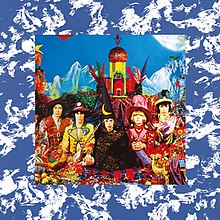On with the Show (song)
| Their Satanic Majesties Request | ||||
|---|---|---|---|---|
 |
||||
| Studio album by The Rolling Stones | ||||
| Released | 8 December 1967 | |||
| Recorded | 9 February – 23 October 1967 | |||
| Studio | Olympic Studios-Studio A, London | |||
| Genre | ||||
| Length | 44:06 | |||
| Language | English | |||
| Label | ||||
| Producer | The Rolling Stones | |||
| The Rolling Stones chronology | ||||
|
||||
| Singles from Their Satanic Majesties Request | ||||
|
||||
| Professional ratings | |
|---|---|
| Review scores | |
| Source | Rating |
| AllMusic |
|
| AllMusic |
|
| The Great Rock Discography | 5/10 |
| MusicHound | 2/5 |
| NME | 8/10 |
| The Rolling Stone Album Guide | |
| The Village Voice | B+ |
Their Satanic Majesties Request is the sixth British and eighth American studio album by the Rolling Stones, released in December 1967 by Decca Records in the United Kingdom and London Records in the United States. Recording sessions saw the band experimenting widely with a psychedelic sound in the studio, incorporating unconventional instruments, sound effects, string arrangements, and African rhythms. The album's title is a play on the "Her Britannic Majesty requests and requires ..." text that appears inside a British passport. It is the first Stones album to feature the same track listings in both its UK and US versions.
Upon its release, Satanic Majesties "drew mixed reviews from the critics as well as some mixed reactions within the group itself". The album was criticised for being derivative of the contemporaneous work of the Beatles, particularly their June 1967 release Sgt. Pepper's Lonely Hearts Club Band, with the similarities extending to the LP's lenticular cover. In subsequent decades, it has gradually risen in critical reputation. Following the album's release, the Rolling Stones abandoned their psychedelic style for a stripped-down return to their roots in blues music.
Begun just after Between the Buttons had been released on 20 January 1967, the recording of Their Satanic Majesties Request was long and sporadic, broken up by court appearances and jail terms. For the same reasons, the entire band was seldom present in the studio at one time. Further slowing productivity was the presence of the multiple guests that the band members had brought along. One of the more level-headed members of the band during this time, Bill Wyman, wary of psychedelic drugs, wrote the song "In Another Land" to parody the Stones' current goings-on. In his 2002 book Rolling with the Stones, Wyman describes the situations in the studio:
...
Wikipedia
